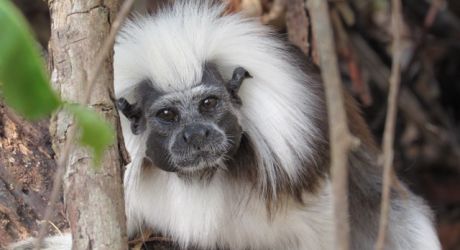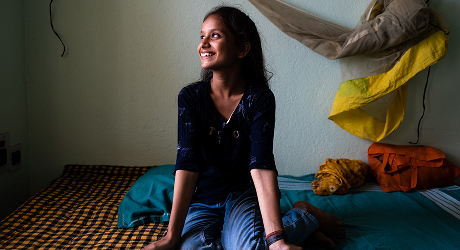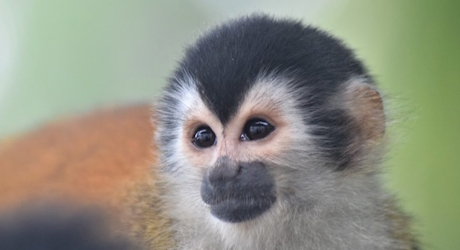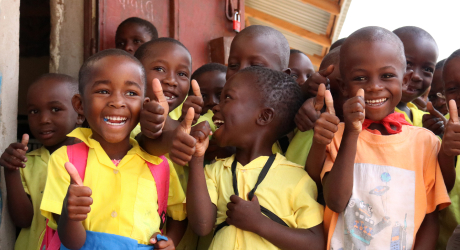Footprints Project
Since 2005, travelers like you have helped us change the world through micro-donations.

-
A total of
8251
Travelers
-
donated
$20008.05
(100% funded) -
to help improve
Environment
-
impacting
140
people -
in
Colombia
Project Background
This support from World Nomads was used towards our forest restoration and monitoring activities from January through December of 2018. Though this work is part of a long-term project, the 2018 activities were conducted and completed as planned.
They focused on:
- The propagation of saplings in our plant nursery,
- Restoration of 41 hectares of forest corridors, and
- Monitoring of a) restoration activities conducted in 2017 in 38 hectares of forest corridors and b) conservation agreements on 26 small farmers’ properties in the village of New Mexico, municipality of San Juan Nepomuceno, northern Colombia, home to wild populations of cotton-top tamarins.
Our forest restoration activities continue in 2019, with the monitoring of the 79 hectares of forest corridors restored in 2017 and 2018 in the village of New Mexico. We will also continue expanding our forest restoration and corridor work into the villages of Bajo Grande and La Espantosa where we will be restoring 120 more hectares of forest corridors this year, working with 30 small farmers.

Project Activities
Nursery propagation:
We propagated more than 26,000 saplings of 26 native tree species that provide food and/or shelter to wild cotton-top tamarins. Seeds from these trees are collected from local sources, including Proyecto Titi’s forest reserve, and cared for by our staff and local farmers until they reach proper size for planting in the forest corridors (+/- 2 feet tall).
Forest Restoration:
We planted more than 26,000 saplings propagated on our nursery to enrich the 41 hectares of forest corridor areas, based on the strategies suggested by a forest restoration plan conducted by our partner organization Fundación Ecosistemas Secos de Colombia (FESC).
Saplings were transported from the nursery to the forest corridors by burros hired from the local community. Due to the steep slopes and narrow paths, it is difficult to use any other means of transportation.
Small farmers participating in the forest restoration project teamed up in groups of four to plant the saplings in the forest corridors. This was done during the rainy season (October through December) to increase the chances of the saplings to adapt to the new soil conditions and context. Farmers received training about forest restoration practices and strategies; plant propagation management; nursery management; and environmentally-friendly farming practices. They also received compensation for their work.

Monitoring of restoration:
We hired two new staff from the local community in 2018 to conduct monitoring routines of the saplings planted in 2017 in the 38 hectares of forest corridors in New Mexico targeted for restoration. We conducted two monitoring routines, documenting survival and growth of a sample of 30% of the saplings planted.
By the end of the two monitoring routines in November of 2018, we recorded a survival rate of 82.8%, which is considered a very positive result.
In 2019, we are conducting a third monitoring routine for the 2017 plantings, and we will conduct two monitoring routines for documenting survival and growth of the 2018 plantings.

Conservation agreements:
The forest corridor restoration work is being conducted in partnership with the local offices of 1) Colombia’s National Park System which administers the Los Colorados Wildlife Sanctuary (the core of our forest conservation and restoration efforts in San Juan Nepomuceno), and 2) Fundación Herencia Ambiental Caribe (FHAC), a local NGO which leads the efforts to train and encourage local farmers to use environmentally-friendly practices.
This is done through the signing of conservation agreements in which farmers receive training and skills to increase productivity through the use of sustainable farming practices, and in turn, they designate at least 10% of their land for forest restoration and conservation.
We monitor these conservation agreements every year, and we are happy to report that by the end of 2018, we documented full compliance with the conservation agreements that protect the designated forest corridors.
What's Next?
Our forest restoration activities continue in 2019, with the monitoring of the 79 hectares of forest corridors restored in 2017 and 2018 in the village of New Mexico.
We will also continue expanding out forest restoration and corridor work into the villages of Bajo Grande and La Espantosa in which we will be restoring 120 more hectares of forest corridors this year, working with 30 small farmers.

Can I Visit the Project?
Yes, you can visit us and see firsthand Proyecto Tití’s conservation work in northern Colombia. If you are interested in visiting, please contact Rosamira Guillen, Proyecto Tití’s Executive Director at rguillen@proyectotiti.com. To set up logistics, please let us know at least one month in advance.
Traveling soon? When you buy travel insurance with us, you can make a contribution towards a cause you care about.
Get a quote






